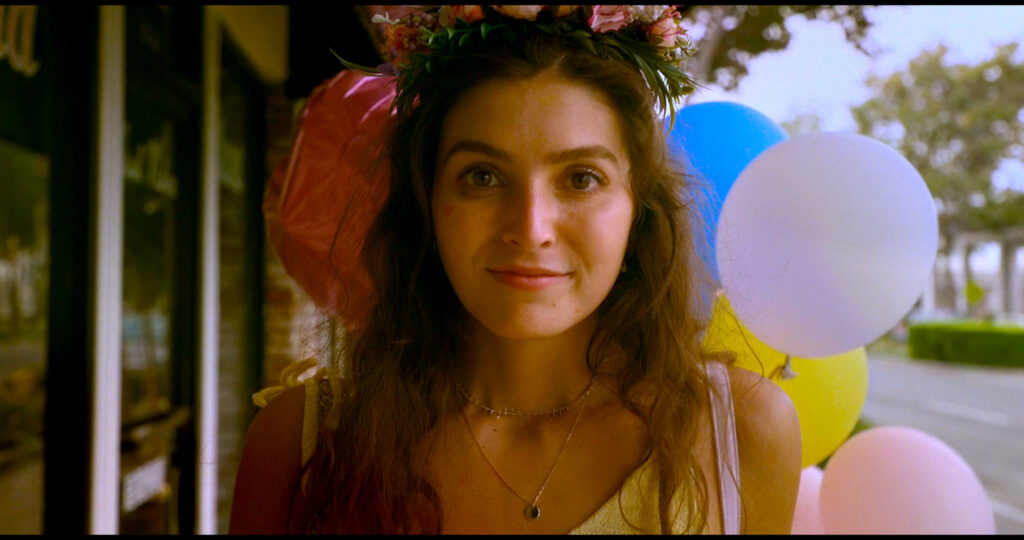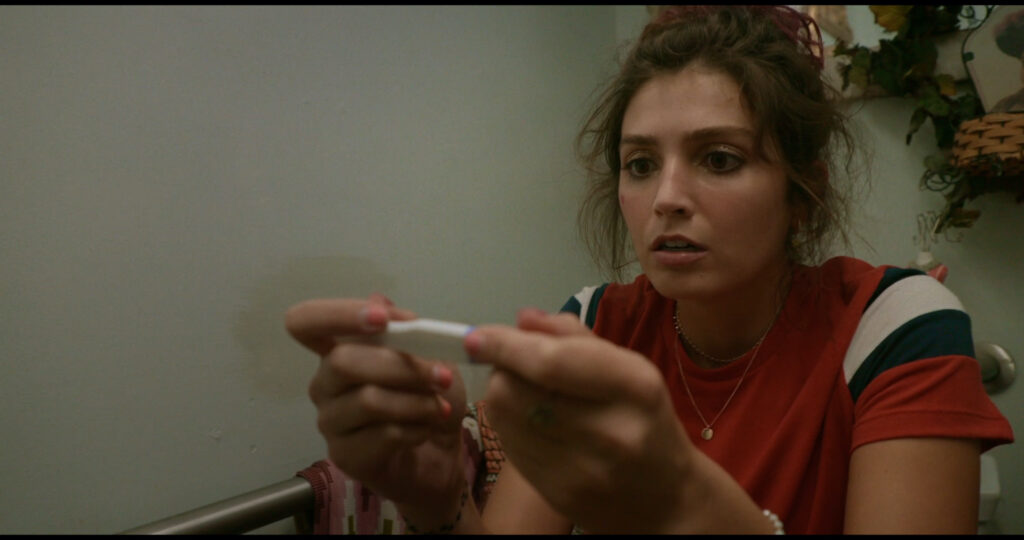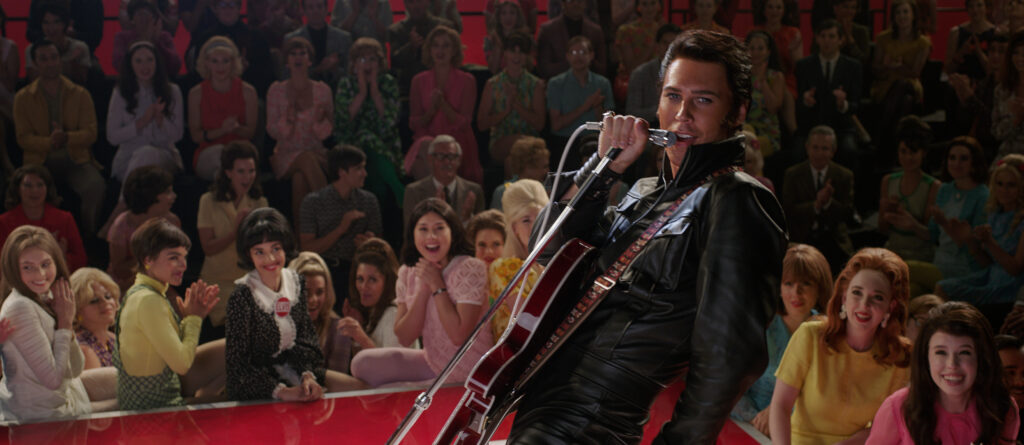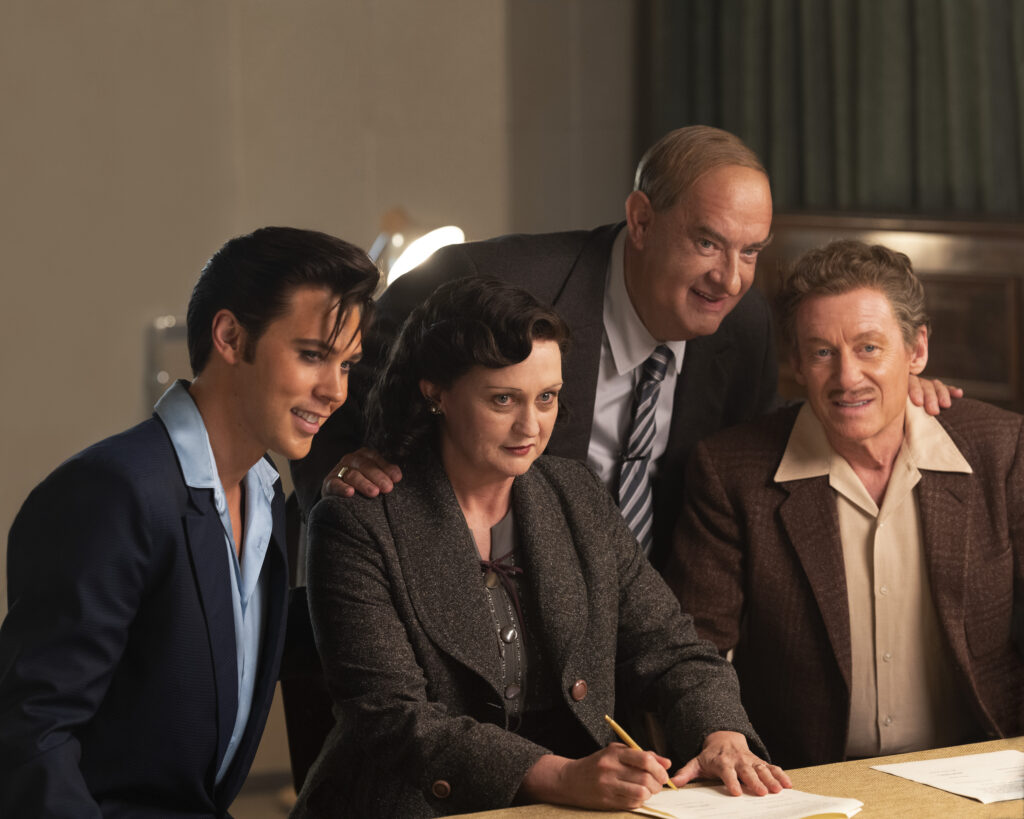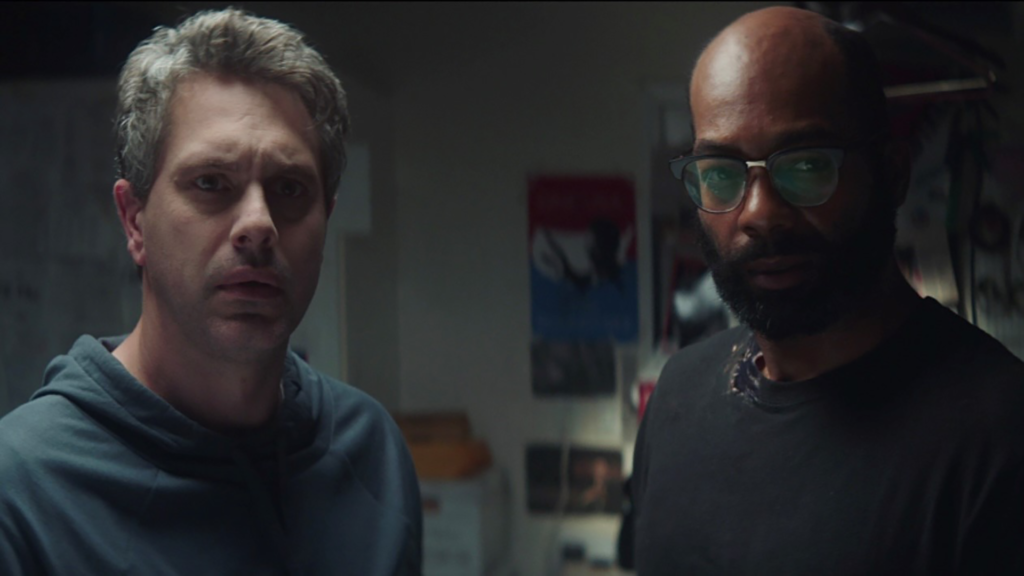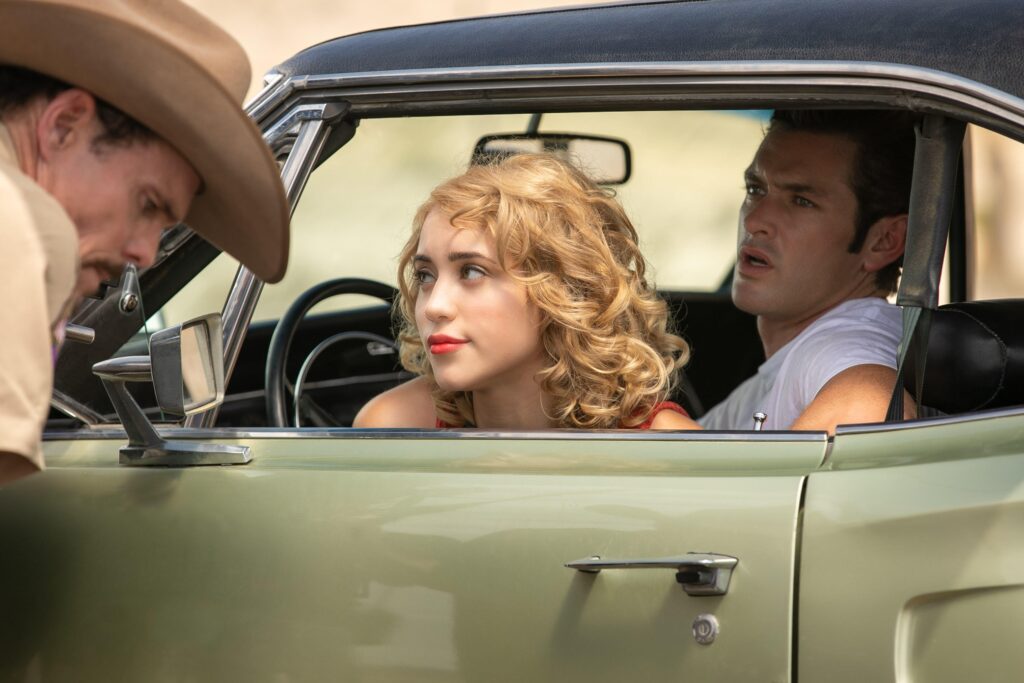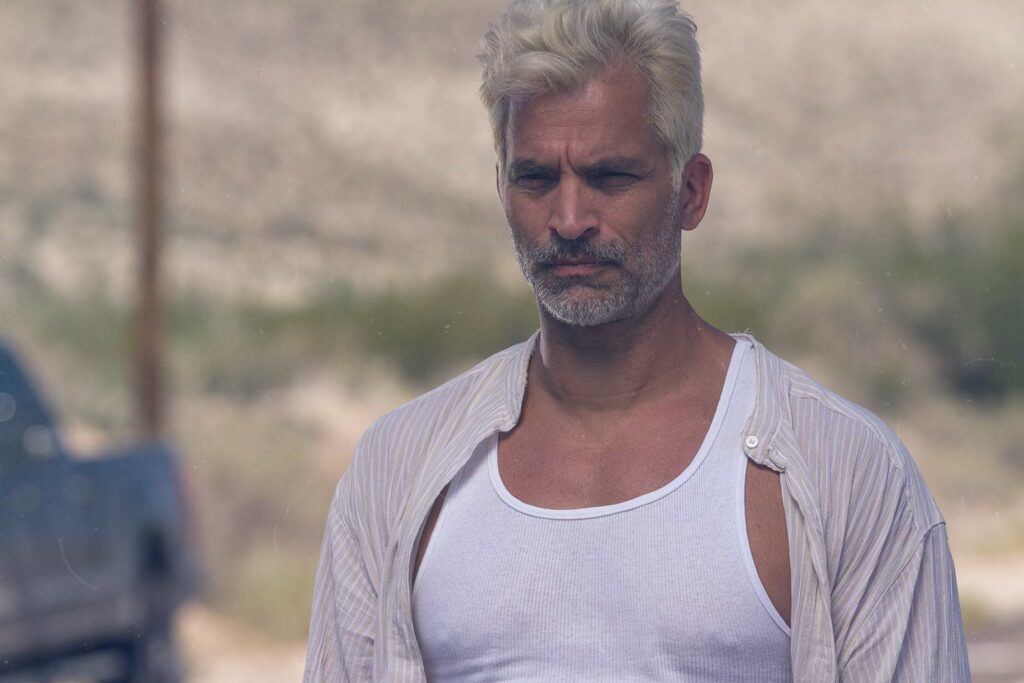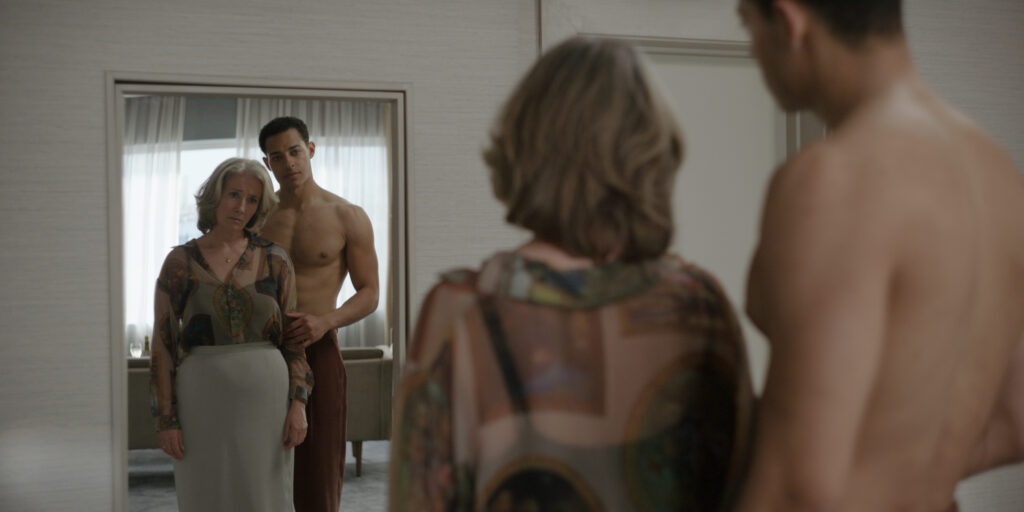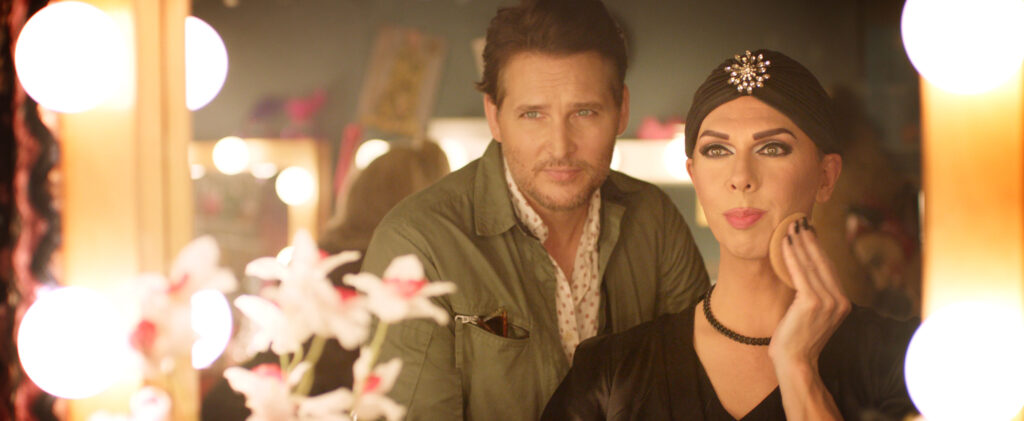July 2, 2022
by Carla Hay

Directed by Alex Heller
Culture Representation: Taking place in Illinois, the comedy/drama film “The Year Between” features a predominantly white cast of characters (with a few African Americans and Asians) representing the working-class and middle-class.
Culture Clash: In her second year of college, an angry, bipolar woman drops out of school after she has a mental breakdown; she moves back in with her parents and two younger siblings; and she tries to figure out what she wants to do with her life while she instigates conflicts with other people.
Culture Audience: “The Year Between” will appeal primarily to people who don’t mind watching movies where mental illness is irresponsibly used as an excuse for someone to be rude, selfish and emotionally damaging to other people.

The misguided comedy/drama “The Year Between” is an irritating slog that offensively uses bipolar disorder as an excuse for the central character to be cruel and toxic to everyone around her. She would be an awful person even without a mental illness. Written and directed by Alex Heller (who is also the star of the movie and is in almost every scene), “The Year Between” is loosely inspired by Heller’s real-life experiences with mental health struggles. The movie had its world premiere at the 2022 Tribeca Film Festival in New York City.
Unfortunately, the tone of “The Year Between” misses the mark in both comedy and drama. Watching this dreadful mess is like being stuck for 94 minutes with a whiny, spoiled brat who acts like she can’t stand to be around other people because she thinks everyone else is annoying, but then she does everything in her power to get negative attention from the people she claims she wants to leave her alone. None of this obnoxiousness is depicted in a way that’s entertaining. In fact, it gets downright repetitive and boring.
In “The Year Between” (which takes place in Illinois), Heller portrays Clemence Miller, the hellish narcissist who spends a lot of her time and energy trying to make everyone around her as miserable as she is. The movie only shows a one-year period of time in Clemence’s life, but viewers can easily figure out from conversations in the movie that Clemence has been a mean-spirited troublemaker for a lot longer than a year, probably her entire life. Heller delivers Clemence’s lines of dialogue in a deadpan manner, in this movie’s failed attempt to make “The Year Between” a witty dark comedy.
Clemence’s bipolar disorder is just the movie’s pathetic way of creating scenarios where Clemence expects people to accept or enable her cruelty because she’s mentally ill. The movie has no balance in showing that not all mentally ill people are atrocious to other human beings. That’s why “The Year Between” is very much a vanity project from Heller, who might have intended to make a meaningful comedy/drama about mental illness, but “The Year Between” is just a bungled mockery of mental illness with a dull and predictable story.
A good movie isn’t defined by how “likable” the main characters are. A good movie is defined by how interesting the characters are and how the story is told. And that’s why “The Year Between” is a disappointing clunker in most regards. The movie has some members of the cast who show talent in their performances, but their characters are limited and stuck saying words from Heller’s messy and rambling screenplay.
“The Year Between” is essentially about a woman in her early 20s behaving badly, with a tone that she’s supposed to be a misunderstood anti-hero just because she has bipolar disorder. In real life, bipolar disorder causes extreme highs and lows in emotions. Bipolar disorder can bring out the worst in people, but it does not make someone vile and nasty if that person already had a tendency to be vile and nasty.
From the movie’s opening scene, it’s clear that Clemence is an emotional terrorist who takes other people as emotional hostages, and then she goes on rants about how everyone else in the world is terrible and uncaring to her. In other words, Clemence loves to play the victim when she is in fact the abuser. If Clemence is Heller’s semi-autobiographical portrait of herself, then it’s a very off-putting way to introduce herself to people.
In the beginning of the movie, Clemence is a second-year student at Western Illinois University in Macomb, Illinois. She storms into her dorm room and accuses her roommate Eliza of wearing Clemence’s shortcake-flavored Chapstick. Clemence then yells at Eliza by saying that their dorm room is a “pig sty,” when the room is actually neat and orderly, compared to a lot of dorm rooms.
Viewers never see the rest of Clemence’s meltdown, but apparently it got worse, because Eliza made a formal complaint to the school that Eliza feared for her safety because of Clemence’s continual and angry outbursts. It was then decided that Clemence would voluntarily leave the school for an unspecified period of time. The movie never shows Eliza making the complaint or whatever meetings took place with university officials that led to this decision. The next thing viewers see is Clemence being driven away from the campus by Clemence’s concerned and loving mother Sherri (played by J. Smith-Cameron), who owns and manages a home goods store.
Playing the victim as usual, Clemence announces to her mother and anyone else who’ll listen that she has no intention of going back to Western Illinois University or enrolling in any other college/university, because she thinks college life is just too stifling for her. As far as Clemence is concerned, a college education is just a waste of time for her because she doesn’t want to live by any college rules. In other words, she doesn’t want anyone to stand up to her and tell her to act like a decent human being.
After dropping out of college, Clemence has to move back home to Oak Brook, Illinois, where her parents live with Clemence’s two younger teenage siblings. Clemence isn’t happy about being in this living situation, so expect to hear a lot of whining from her about being stuck back in her childhood home with family members who get on her nerves. It’s quite the display of entitlement from a college dropout who has the privilege of having a family who will take her back into the home after being such a screw-up and troublemaker.
As Sherri drives Clemence back to the neighborhood where the family home is, Clemence makes a typical snide Clemence remark as she looks around the neighborhood: “Someone should bomb the place.” Clemence gets even more agitated when she finds out that she has to live in the basement because her parents turned her former bedroom into a home office. And when Clemence doesn’t get her way, look out: People will be the target of her wrath.
Soon after Clemence moves back into the family home, Clemence and Sherri are seen in an appointment with a psychiatrist named Dr. Lismoen (played by Waltrudis Buck), who has diagnosed Clemence with having bipolar disorder. Clemence has exhibited bipolar symptoms of hoarding, stealing, paranoia and extreme insomnia. Dr. Lismoen is empathetic but firm in how Clemence should proceed with taking medication to treat the bipolar disorder.
The doctor says that it might take a lot of time to find the right medication “cocktail” that works best for Clemence. Dr. Lismoen also warns that some of the medication side effects will be uncomfortable. It’s news that Clemence doesn’t want to hear, so she thinks the doctor is incompetent. Dr. Lismoen also tells Clemence that Clemence should see a therapist, so Clemence isn’t happy about that either.
Here’s an example of what a horrible person Clemence is: In the waiting room of Dr. Lismoen’s office, Clemence and Sherri are sitting near an obviously upset woman (played by Sarah Schol), who is sobbing about something. Clemence and Sherri have no idea who this woman is or what this woman’s personal problems are. When Clemence and her mother are called into Dr. Lismoen’s office, Clemence passes by the distressed woman and snarls at her: “Basket case.” (It’s a derogatory slur for a mentally ill person.)
And later, when Clemence has her first session with her therapist Dr. Madzen (played by Jon Hudson Odom), she has this to say about Dr. Lismoen, who is a German immigrant: “I call her ‘the German woman,’ to take away her power.” Clemence adds, “I don’t take life advice from mentally ill burnouts.” None of this is funny, of course, but “The Year Between” filmmaker Heller desperately wants it to be.
At home, Clemence complains and gives constant criticism to her family members for not being more accommodating to her. Sherri and her mild-mannered husband Don (played by Steve Buscemi) are admittedly unsure of how to deal with Clemence’s bipolar disorder. Don’s reaction is just to let Clemence mouth off and not try to get into any arguments with her. Sherri’s way of coping is ordering Clemence to do yoga with her.
Clemence’s younger sister Carlin (played by Emily Robinson), who’s 17 or 18 years old, is an overachiever in her last year of high school. Carlin is preoccupied with finding out if she will get into her top-choice university. Meanwhile, a jealous Clemence tries to discourage Carlin from going to college. Carlin and Clemence are opposites in a lot of ways, so Carlin is the person in the family whom Clemence clashes with the most.
Clemence’s younger brother Neil (played by Wyatt Oleff), who’s about 16 or 17 years old, has an easygoing personality and tries to stay out of Clemence’s way. When Clemence unapologetically eats all of the bread in the house refrigerator, and someone in the family gripes about it, Clemence angrily reacts as if her rights are being violated. And so, when Neil later wants to make a meat sandwich, he just eats the meat by itself instead of trying to get into what would be an emotionally exhausting confrontation with Clemence.
Clemence also manipulates her family by making alarming suicidal comments. She mopes around the house and sleeps a lot, which are all valid signs of depression. But then she says to her father Don: “Dad, if the house burns down, I want to sleep through it.” How is a parent supposed to react when hearing this disturbing comment from a child? “The Year Between” reprehensibly treats it like a joke.
Believe it or not, Clemence is capable of being nice. There’s a brief scene early in the movie where she’s walking the family dog Chauncey outside on a street, and Clemence says a polite hello to a neighbor. But that display of friendliness is short-lived and rare for Clemence.
As an example of how she still has bipolar episodes, there’s a scene in the movie where Clemence walks the dog but doesn’t come back until several hours later when it’s night, without telling anyone in her family where she was and that she was taking the dog away for hours. When she comes back home, with no explanation for her long absence, Clemence is dismissive of her mother’s worried feelings. Clemence is legally an adult, so she shouldn’t have to be treated like a child, but she often acts like a petulant child.
What’s so horrific about “The Year Between” is that it constantly makes a point that people shouldn’t really confront Clemence about her cruelty and selfishness because she has bipolar disorder. Clemence wants people to respect her, but she’s not willing show basic respect for other people. And her disrespect is not something that can be blamed on Clemence’s bipolar disorder, but the movie wants to make it look like her bipolar disorder is largely to blame.
Not long after moving back in with her parents, Clemence commits what she thinks is an act of rebellion: She shaves off all of the hair on her head. And so, for the rest of the movie, Clemence has “chip on her shoulder” reactions if people look at her strangely because of her bald head. When some teenage boys pass her on a street, she doesn’t like the way they’re looking at her, so she blurts out to them, “I eat ass!” This is what’s supposed to be pass as “comedy” in “The Year Between.”
Clemence isn’t a complete freeloader at home because she attempts to find a job. She applies to be a sales clerk at a discount clothing/furniture store called Big Deals, even though her people skills are horrible, she has no retail sales experience, and she’s very abrasive in her job interview. But lo and behold, she easily gets the job. It’s just more of Clemence’s privilege on display.
The Big Deals employee who’s been assigned to train Clemence is a sassy and intelligent woman in her late teens named Beth (played by Kyanna Simone), who tells Clemence that she will be quitting this dead-end retail job in the near future because Beth has a lacrosse scholarship to attend Duke University. Clemence is already annoyed that she’s being trained by someone who’s younger than Clemence. And when Clemence hears that Beth has plans to go to college, Clemence gets envious of Beth.
Still, Clemence has no friends, so she tries to become Beth’s friend. It won’t make Clemence look any less loathsome, because Clemence’s idea of a “friend” is to have someone listen to her rant about how much other people ignore or misunderstand Clemence. However, the scenes with Clemence and Beth are among the movie’s few highlights.
What doesn’t work as well is the movie’s subplot about Clemence’s love life. In a convenience store parking lot, she sees a guy named Ashik (played by Rajeev Jacob), who was a classmate in high school. Ashik and Clemence haven’t seen each other since their high school days.
Clemence and Ashik make awkward small talk and catch up on what they’ve been doing with their lives. After they exchange phone numbers, they flirt online and take tentative steps toward dating. Ashik is also drifting in life and lives at home with his mother. Unfortunately, Ashik is a hollow character with not much to offer to this movie, so the would-be romance between Ashik and Clemence falls flat.
“The Year Between,” just like Clemence, is very irritable, monotonous and aimless. It seems like the movie was made to create sympathy for whatever real-life misdeeds that might have inspired the awfulness of Clemence. Viewers won’t be entirely sure how much of the real Heller is in Clemence, but what’s shown in the movie is someone with a very heinous personality.
As for her bipolar disorder, Clemence doesn’t seem concerned about getting better. She just wants to wallow in her misery. And when someone else in the family has a major health problem, Clemence reaches new lows of despicable narcissism. Any attempts to redeem Clemence look very fake. Viewers will be left wondering why “The Year Between” was even made, when there’s really no point to the movie, except to show someone being chronically self-centered and emotionally abusive to others, with no maturity or self-awareness.
UPDATE: Gravitas Ventures will release “The Year Between” in select U.S. cinemas, on digital and VOD on March 3, 2023. Peacock will premiere the movie on May 1, 2023.

